

FOX News, MSNBC and Objectivity - Objectivity in Cable News. This is a confusing time for journalism students.

Professors stress the importance of objectivity in reporting, but some of the most prominent journalists in the country - the hosts of cable TV talk shows - are anything but objective. So what's going on? What's going on is that two of the three main cable news channels - FOX News and MSNBC - have discovered that opinion-based talk shows get high ratings. High ratings mean more money for these networks, so there's little incentive for either FOX or MSNBC to change their formats any time soon. FOX, on the one hand, is the conservative alternative for people who believe the so-called mainstream media have a liberal bent.
MSNBC, meanwhile, has in recent years positioned itself as the liberal alternative to FOX. There's a reason O'Reilly, Olbermann and their ilk are popular - they're entertaining. Is Objective Journalism Good Journalism? Posted on 08. Dec, 2009 by Amy Berryhill in Jeremy Caplan, Urban Author Michael Schudson writes in Discovering the News that objectivity is a fairly recent goal in news gathering. His book explains that the rise of objectivity can be tied to the post WW1 era, saying, “journalists came to believe in objectivity, to the extent that they did, because they wanted to, needed to, were forced by ordinary human aspiration to seek escape from their own deep convictions of doubt and thrift.” Times have changed. The Problem With Objective Journalism. There Is No Such Thing As ‘Objective’ Journalism — Get Over It. You read that correctly.
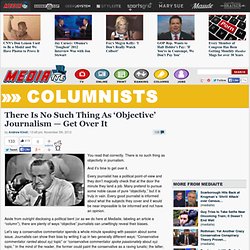
There is no such thing as objectivity in journalism. And it’s time to get over it. Every journalist has a political point-of-view and they don’t magically check that at the door the minute they land a job. Many pretend to pursue some noble cause of pure “objectivity,” but it is truly in vain. Every good journalist is informed about what the subjects they cover and it would be near-impossible to be informed and not have an opinion. Aside from outright disclosing a political bent (or as we do here at Mediaite, labeling an article a “column”), there are plenty of ways “objective” journalists can unwittingly reveal their biases.
Let’s say a conservative commentator spends a whole minute speaking with passion about some issue. There is also the more indirect form of tipping your hand: selection bias. I’ll start: If you read any of my posts labeled as “columns,” you might already know that I am a libertarian. Should Journalists Be Objective or Tell the Truth? Is it a reporter's job to be objective or to tell the truth, even if it means contradicting statements by public officials in news stories? That's the debate New York Times public editor Arthur Brisbane stumbled into recently when he raised that question in his column. In a piece headlined "Should The Times Be a Truth Vigilante? ", Brisbane noted that Times columnist Paul Krugman "clearly has the freedom to call out what he thinks is a lie.
" Then he asked, "should news reporters do the same? " Brisbane didn't seem to realize this question has been chewed over in newsrooms for awhile now, and is one that vexes readers who say they are tired of traditional "he-said she-said" reporting that gives both sides of the story but never reveals the truth. As one Times reader commented: "The fact that you would ask something so dumb simply reveals how far you've sunk. Added another: JON STEWART GETS MAD! Recovered Public Journalism and the Problem of Objectivity.htm. Matt Bai and the problems with "objective" journalism - Brendan Nyhan. Matt Bai, the New York Times Magazine's political reporter, illustrates the essential formula for "objective" journalism: all criticisms must be balanced with praise, no matter how strained or implausible.
That gives rise to incoherence like this: Unlike most of his Democratic detractors, Bush has shown the vision to rethink time-honored orthodoxy, even at his own political peril; no matter what his critics may say, it took no small amount of courage to ask if Social Security could be stronger than it is or if the tax code could be simpler and less punitive. He recognizes that government should be more flexible and more consumer-oriented. But in every specific case, it seems, Bush has quickly settled on solutions that aim to dismantle government rather than to improve it and that leave the average family more insecure rather than more enabled. This is just nonsense. Similarly, the account of Bush's tax cuts is bizarre.
What is objectivity in journalism? Objectivity is expressing or dealing with facts or conditions as perceived without distortion by personal feelings, prejudices or interpretations.
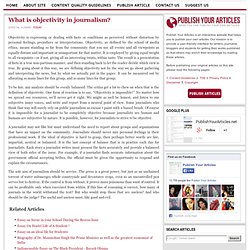
Objectivity, as defined by the school of media ethics, means standing so far from the community that you see all events and all viewpoints as equally distant and important or unimportant for that matter. It is employed by giving equal weight to all viewpoints—or if not, giving all an interesting twists, within taste. The result is a presentation of facts in a true non-partisan manner, and then standing back to let the reader decide which view is true.
By going about it this way, we are defining objectivity not by the way we go about gathering and interpreting the news, but by what we actually put in the paper. It can be measured out by allocating so many lines for this group, and so many lines for that group. To be fair, any analysis should be evenly balanced. The sole aim of journalism should be service. Journalism, Objectivity, Objectivity in News Reporting, Fox News, MSNBC. Is objectvity dead?
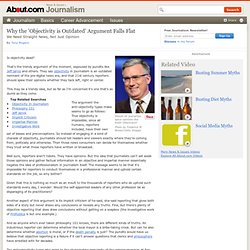
That's the trendy argument of the moment, espoused by pundits like Jeff Jarvis and others. An Argument Why Journalists Should Not Abandon Objectivity. In “Losing the News: The Future of the News that Feeds Democracy,” published by Oxford University Press, Alex S.
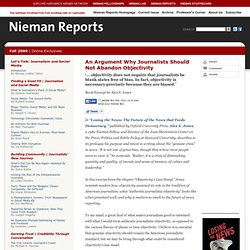
Jones, a 1982 Nieman Fellow and director of the Joan Shorenstein Center on the Press, Politics and Public Policy at Harvard University, describes in its prologue his purpose and intent in writing about the “genuine crisis” in news. Martha Raddatz and the faux objectivity of journalists. Numerous commentators (including me) were complimentary of the performance of Martha Raddatz as the moderator of Wednesday night's vice-presidential debate.
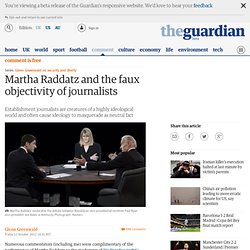
She was assertive, asked mostly substantive questions, and covered substantial ground in 90 minutes. That's all true enough, but the questions she asked reveal something significant about American journalism in general and especially its pretense of objectivity. For establishment journalists like Raddatz, "objectivity" is the holy grail. Objectivity (journalism)
Journalistic objectivity is a significant principle of journalistic professionalism.
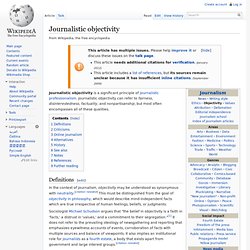
Journalistic objectivity can refer to fairness, disinterestedness, factuality, and nonpartisanship, but most often encompasses all of these qualities. Definitions[edit] Sociologist Michael Schudson argues that "the belief in objectivity is a faith in 'facts,' a distrust in 'values,' and a commitment to their segregation.
"[1] It does not refer to the prevailing ideology of newsgathering and reporting that emphasizes eyewitness accounts of events, corroboration of facts with multiple sources and balance of viewpoints. Criticisms[edit] Advocacy journalists and civic journalists criticize the understanding of objectivity as neutrality or nonpartisanship, arguing that it does a disservice to the public because it fails to attempt to find truth.